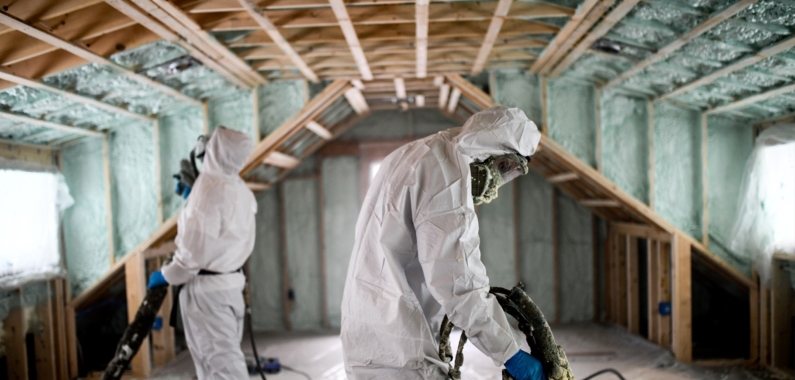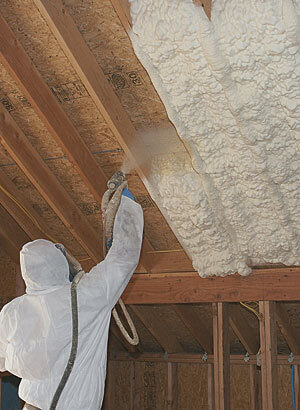Common Misconceptions Concerning Spray Foam: Debunking the Misconceptions
Common Misconceptions Concerning Spray Foam: Debunking the Misconceptions
Blog Article
Spray Foam: The Ultimate Remedy for Air Sealing and Insulation
Spray foam insulation has arised as a leading service for effective air securing and thermal insulation, supplying a distinct combination of residential properties that establish it apart from conventional techniques. Comprehending the complete range of its benefits, installation procedures, and comparisons with other insulation kinds is critical for making educated choices.
What Is Spray Foam?
Spray foam is a versatile insulation product that incorporates the principles of air sealing and thermal resistance to boost power effectiveness in buildings. Made up mainly of polyurethane or other comparable substances, spray foam is applied as a fluid that broadens upon contact with surface areas, producing a solid, constant layer of insulation. This distinct residential property enables it to load spaces, cracks, and gaps that conventional insulation products may overlook, supplying an exceptional air seal.
There are 2 primary kinds of spray foam: open-cell and closed-cell. Open-cell spray foam is lighter and a lot more flexible, using outstanding audio absorption and a reduced R-value per inch - Spray Foam. In comparison, closed-cell spray foam is denser, providing a greater R-value, moisture resistance, and added architectural stability to constructing components
The application procedure generally entails specialized devices, ensuring a seamless application that sticks to various substratums, consisting of concrete, steel, and timber. This adaptability makes spray foam ideal for both brand-new constructions and retrofitting existing frameworks. Its capacity to create a closed obstacle significantly adds to minimizing power usage and enhancing interior air quality, thus making it a recommended selection among building contractors and homeowners alike.
Advantages of Spray Foam Insulation
Among one of the most significant advantages of spray foam insulation is its extraordinary capacity to develop a continual air obstacle, which effectively minimizes energy loss. Unlike traditional insulation materials, spray foam expands to fill gaps and cracks, guaranteeing that air leakage is considerably minimized. This particular not just boosts power performance however likewise results in reduce utility bills over time.
In addition, spray foam insulation gives premium thermal resistance, adding to a much more stable indoor setting. Its high R-value per inch permits efficient insulation in restricted spaces, making it ideal for attic rooms, wall surfaces, and crawl spaces. Furthermore, the moisture-resistant homes of spray foam help prevent mold and mildew and mildew growth, advertising healthier living conditions.
One more crucial advantage of spray foam insulation is its sound-dampening high qualities (Spray Foam). It effectively lowers noise transmission in between spaces, developing a quieter and a lot more comfortable home atmosphere. The sturdiness of spray foam additionally sticks out, as it does not sag or resolve in time, keeping its performance throughout its life-span
How Spray Foam Functions
Understanding exactly how spray foam insulation works is necessary for appreciating its efficiency in air securing and thermal resistance. Spray foam insulation consists of 2 key components: isocyanate and polyol material. When these parts are blended, they go through a chain reaction that triggers the product to expand quickly, developing a dense foam that fills up fractures, spaces, and tooth cavities.
As the foam expands, it follows surface areas, developing an impermeable seal that significantly lowers air seepage. This particular makes spray foam insulation highly efficient at stopping drafts and dampness infiltration, which can lead to energy loss and damage in time. Furthermore, the closed-cell version of spray foam supplies superior thermal resistance due to its stiff structure, efficiently lessening warm transfer.
The one-of-a-kind residential or commercial properties of spray foam enable it to adapt to uneven surface areas, making sure detailed protection and a smooth barrier. Therefore, spray foam insulation not only enhances energy performance yet additionally adds to boosted interior air high quality by decreasing the accumulation of allergens and pollutants. Eventually, comprehending the mechanics behind spray foam underscores its duty as a premium selection for insulation and air sealing in both business and property applications.
Setup Refine Introduction

Prior to installment, the space needs to be adequately cleaned up and prepped, making certain that surfaces are without dirt, particles, and moisture. Due to the fact that contaminants can compromise attachment and overall performance, this action is important. As soon as the area is prepared, the application involves blending the 2 parts of the spray foam, which broadens upon call and fills up gaps successfully.
Trained professionals ought to carry out the installation, utilizing specialized equipment to guarantee uniform coverage and optimal density. Safety precautions, including putting on safety equipment and making certain correct air flow, are imperative throughout this procedure. After application, the foam commonly treatments swiftly, developing a solid barrier that boosts power effectiveness.
Comparing Spray Foam to Traditional Insulation
When evaluating insulation alternatives, spray foam insulation attracts attention in contrast to standard materials such as fiberglass and cellulose. Among the key advantages of spray foam is its superior air securing capacities. Unlike fiberglass and cellulose, which can enable air infiltration, spray foam increases upon application, filling up gaps and holes to develop a closed seal. This results in boosted power efficiency, as much less heated or cooled down air gets away the home, resulting in reduced utility costs.
Additionally, spray foam supplies a higher R-value per inch than standard insulation types, using more efficient thermal resistance in a thinner account. This characteristic is specifically useful in rooms with limited dental caries depth. Moreover, spray foam is immune to moisture and mold and mildew development, which can be a considerable problem with cellulose and fiberglass, particularly in damp settings.
However, spray foam insulation commonly carries a higher in advance cost than its standard counterparts. Home owners need to evaluate this initial financial investment against long-term energy cost savings and efficiency advantages. Ultimately, while both insulation types serve their function, spray foam arises as an advanced solution for modern insulation needs, especially in terms of air sealing and thermal effectiveness.

Conclusion
In summary, spray foam insulation represents a highly reliable remedy for attaining optimum air securing and thermal resistance. Its special buildings, consisting of wetness resistance and noise dampening, make it appropriate for various applications in both brand-new building and constructions and retrofitting tasks (Spray Foam). Although the first expenses may be higher contrasted to standard insulation materials, the long-term advantages, such as substantial energy savings and boosted interior air high quality, justify the financial investment and highlight its value in modern-day structure practices.
Spray foam insulation has arised as a leading option for effective air securing and thermal insulation, offering an one-of-a-kind combination of residential or commercial properties that establish it apart from conventional approaches.Spray foam is a flexible insulation product that integrates the concepts of air sealing and thermal resistance to boost energy effectiveness in structures.When examining insulation alternatives, spray foam insulation stands out in comparison to typical materials such as fiberglass and cellulose. Eventually, while both insulation kinds serve Website their objective, spray foam emerges like this as a much more innovative solution for contemporary insulation demands, particularly in terms of air securing and thermal performance.
In summary, spray foam insulation stands for a very effective option for attaining optimal air sealing and thermal resistance.
Report this page